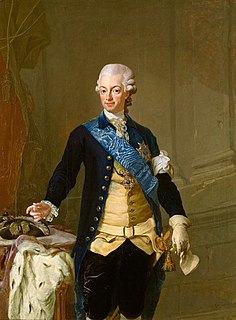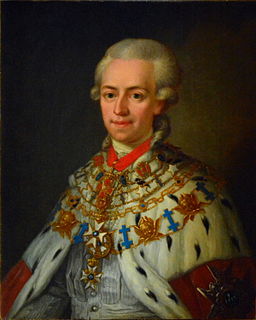
The Privy Council of the United Kingdom, officially Her Majesty's Most Honourable Privy Council, or known simply as the Privy Council (PC), is a formal body of advisers to the Sovereign of the United Kingdom. Its membership mainly comprises senior politicians who are current or former members of either the House of Commons or the House of Lords.

The Federal Chancellor of the Republic of Austria is the head of government of the Republic of Austria. The position corresponds to that of Prime Minister in several other parliamentary democracies.

The Council of the Realm, or simply The Council, was a cabinet of medieval origin, consisting of magnates which advised, and at times co-ruled with, the King of Sweden.

The prime minister is the chief minister of the Crown of the Government of Sweden. The prime minister, along with their cabinet, exercise executive authority in the Kingdom of Sweden and are subject to the Parliament of Sweden. The prime minister is nominated by the Speaker of the Riksdag and elected by the chamber by simple majority, using negative parliamentarianism.
Chancellor is a title of various official positions in the governments of many nations. The original chancellors were the cancellarii of Roman courts of justice—ushers, who sat at the cancelli or lattice work screens of a basilica or law court, which separated the judge and counsel from the audience. A chancellor's office is called a chancellery or chancery. The word is now used in the titles of many various officers in various settings. Nowadays the term is most often used to describe:

The Instrument of Government of 1634 was a document describing the form and operation of the Swedish government, retrospectively regarded as the country's first constitution, although it was not intended to function as such. It was composed by the Lord High Chancellor, Axel Oxenstierna, and was adopted by the Riksdag of the Estates on 29 July 1634. It was rendered void when the Riksdag repudiated it in 1680.

The lord chancellor, formally the lord high chancellor of Great Britain, is the highest-ranking among the Great Officers of State in England in the United Kingdom, nominally outranking the prime minister. The lord chancellor is appointed by the sovereign on the advice of the prime minister. Prior to their Union into the Kingdom of Great Britain, there were separate lord chancellors for the Kingdom of England and the Kingdom of Scotland; there were lord chancellors of Ireland until 1922.
Justiciar is the English form of the medieval Latin term justiciarius or justitiarius. During the Middle Ages in England, the Chief Justiciar was roughly equivalent to a modern Prime Minister of the United Kingdom, as the monarch's chief minister. Similar positions existed in continental Europe, particularly in Norman Italy and in the Carolingian Empire.

The 1772 Instrument of Government was the constitution of the Kingdom of Sweden from 1772 to 1809. It was promulgated in the wake of the Revolution of 1772, a self-coup mounted by King Gustav III, and replaced the 1720 Instrument of Government, which had been in force for most of the Age of Liberty (1719-72). Although in theory the 1772 Instrument merely readjusted the balance of power between the crown and the Riksdag of the Estates, without changing Sweden's status as a constitutional monarchy, in practice it is generally seen as instituting an absolute monarchy, especially after its modification in 1789 by the Union and Security Act, which further strengthened royal power at the expense of the Riksdag. It remained in force throughout the Gustavian era, until replaced by the 1809 Instrument of Government as a result of the Coup of 1809.
Riksrådet, Rigsrådet or is the name of the councils of the Scandinavian countries that ruled the countries together with the kings from late Middle Ages to the 17th century. Norway had a Council of the Realm that was de facto abolished by the Danish-Norwegian king in 1536–1537. In Sweden the parallel Council gradually came under the influence of the king during the 17th century.
Seneschal of the Realm, Riksdrots (Swedish), Rigsdrost (Danish), or Valtakunnandrotsi (Finnish) is a Danish and Swedish name of a supreme state official, with at least a connotation to administration of judiciary, who in medieval Scandinavia was often a leader in the government.
The Lord High Constable was a prominent and influential office in Sweden, from the 13th century until 1676, excluding periods when the office was out of use. The office holder was a member of the Swedish Privy Council and, from 1630 and on, the head of the Swedish Council of War. From 1634, the Lord High Constable was one of five Great Officers of the Realm.
The Lord High Steward or Lord High Justiciar was a highly prominent member of the Swedish Privy Council from the 13th century until 1809, excluding periods when the office was out of use.

Count Johan Gabriel Oxenstierna is considered one of the foremost Swedish poets of the Gustavian period. A prominent courtier during the reign of King Gustav III of Sweden, he was also a politician, diplomat and member of the Swedish Academy, holding seat number 8. On several occasions he was a member of the Swedish Government and Parliament. Amongst other things, Oxenstierna is also known for his translation into Swedish of John Milton's epic blank verse poem Paradise Lost.
The Great Officers of the Realm were the five leading members of the Swedish Privy Council from the later parts of the 16th century to around 1680. With the constitution of 1634, the five officers became heads of five different branches of government. The same constitution also declared that the great officers were to act as regents during the minorities of kings or regnal queens. All great officers of the realm were abolished by king Carl XI of Sweden. The Lord High Steward and the Lord High Chancellor offices were revived in the late 18th century, but were soon removed again.
The Lord High Admiral or Admiral of the Realm was a prominent and influential office in Sweden, from c. 1571 until 1676, excluding periods when the office was out of use. The office holder was a member of the Swedish Privy Council and the head of the navy and Admiralty of Sweden. From 1634, the Lord High Admiral was one of five Great Officers of the Realm.
The Lord High Treasurer was a highly prominent member of the Swedish Privy Council between 1602 and 1684, excluding periods when the office was out of use. The Lord High Treasurer was head of the Kammarkollegium and, from 1634, one of five Great Officers of the Realm.

Count Magnus Gabriel De la Gardie was a Swedish statesman and military man. He became a member of the Swedish Privy Council in 1647 and came to be the holder of three of the five offices counted as the Great Officers of the Realm, namely Lord High Treasurer, Lord High Chancellor and Lord High Steward. He also served as Governor-General in the Swedish dominion of Livonia.
Admiral of the Realm was a military and political title given to nobles in Denmark-Norway, Sweden and Holy Roman Empire.















